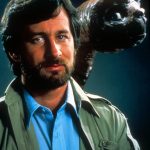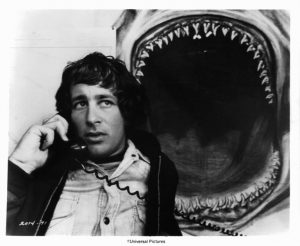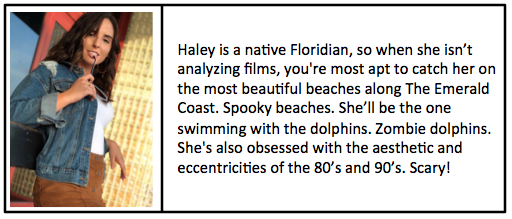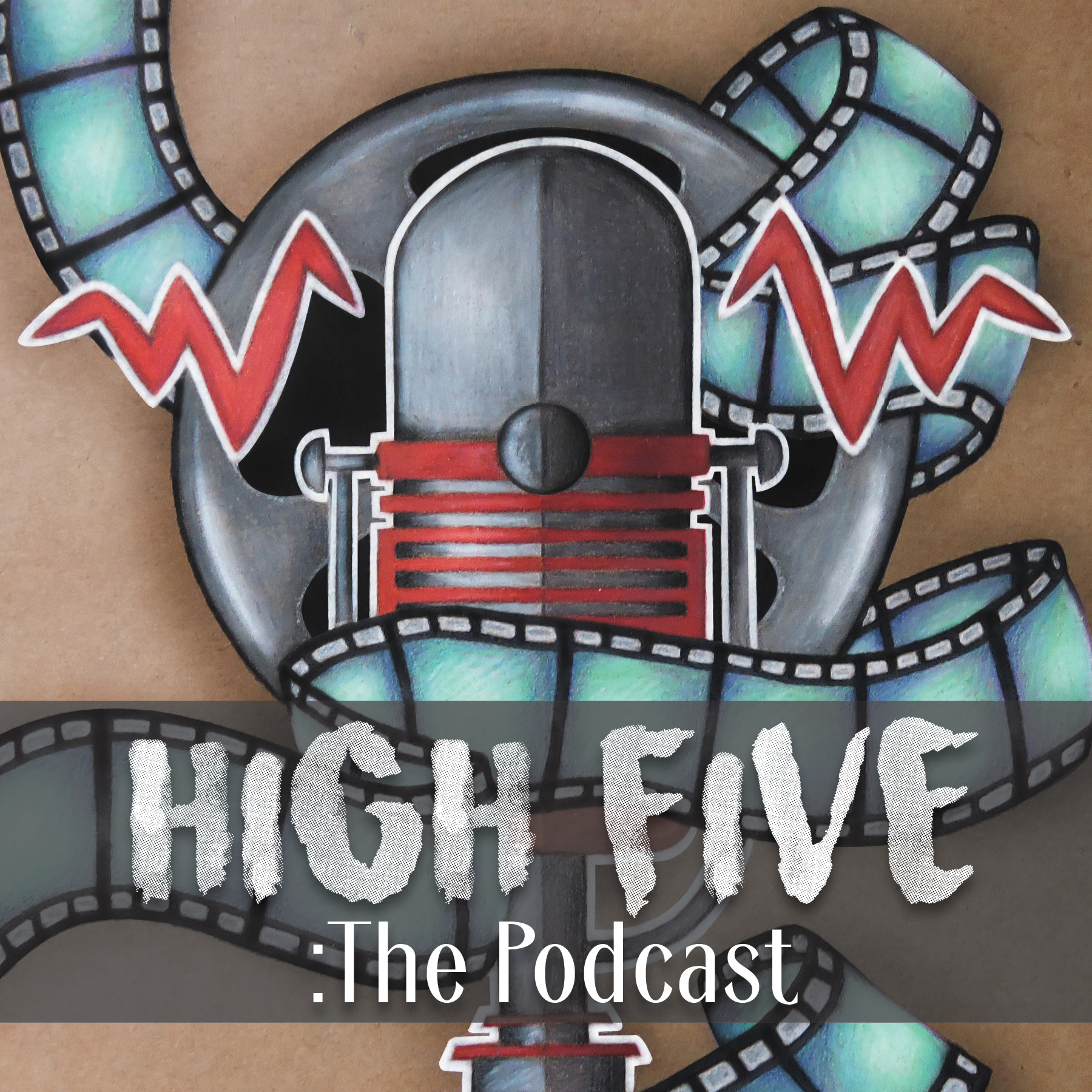Are you into horror films? Like, REALLY into horror films? We call bullshit. No one is more into horror than our mainline to the under-verse, Haley. She breaks down your favorite scary flicks better than you knew possible. Her keen eye catches the scene within the scene and gives her the skills to critique films so you lucky High Fivers can glean a deeper knowledge of the psychology that is unique to the horror genre. Welcome, to the Gates of Haley.
A Quick Examination of Horror Masterminds: Steven Spielberg
I’m going to assume you, much like me, have an insatiable appetite for more Stranger Things. Yes, like an “I need more episodes more than I need caffeine,” scratch your neck and feign for the beautiful cinematic blend of acting, atmosphere, and score that is the Stranger Things series. Of course, you feed this hunger with watching the same episodes an ungodly amount of times. As I watched again (and again), I began to notice several homages paid to past horror films and extremely familiar almost nostalgic film work. This couldn’t be by chance, so I instantly took to the Internet. As it turns out, the Duffer Brothers (the minds behind Stranger Things) were heavily influenced by the works and visuals of Steven Spielberg. Ah, it all makes sense now! But I began asking myself, with all this new-age horror, where are the ideas and influences coming from? What really is the mother of the horror movies we have today? If you’re asking yourself the same thing, you’re in the right place. I’ve dug through the depths of the Internet and horror fandoms to bring you a series on the directors behind the most iconic horror films, and how they have paved the way for feature films today, and in the future.
sense now! But I began asking myself, with all this new-age horror, where are the ideas and influences coming from? What really is the mother of the horror movies we have today? If you’re asking yourself the same thing, you’re in the right place. I’ve dug through the depths of the Internet and horror fandoms to bring you a series on the directors behind the most iconic horror films, and how they have paved the way for feature films today, and in the future.
Since he’s mentioned above and one of my most highly-regarded directors, let’s take a look at Steven Spielberg’s short, but very notable horror, career, and how he pulled off creating a feeling of true fear while maintaining the realness of family and community, which heavily influenced him. While he hasn’t held the title “horror director” in the past twenty years, Spielberg is the mind and executor behind three of the most iconic and highly-regarded films in horror history.
Spielberg was noticed in Hollywood at the very young age of 21. After his fantastic work in his 1968 short film, “Amblin,” he found himself being eyed by some of the biggest in the business. Only two short years and a few TV directions after, Spielberg had landed a contract with Universal. This contract entailed five years of exclusive production, and six years of non-exclusive direction. He carefully used his time and upcoming  fame to direct three more feature films, The Sugarland Express most notably, before he was signed to direct Jaws (1975), which was the pivotal point in his career.
fame to direct three more feature films, The Sugarland Express most notably, before he was signed to direct Jaws (1975), which was the pivotal point in his career.
The making of Jaws was extremely difficult for Spielberg. His original plan for his cast failed, he went four times over the given budget, and all of his props (including the mechanical shark) were failing him, hours of film were almost lost forever in a freak boat sinking incident, and the script itself was being written during the filming process. It seemed as if his first “big break” was going to be an undoubtable fail. After a grueling filming process and many a name being called (“Flaws”, anyone?) Spielberg released the final cut that turned the heads of the entire nation. Jaws became the most talked-about horror film of its time, striking fear, and paranoia into the hearts of all. The film went on to become the highest grossing film of its year, surpassing even Rocky Horror Picture Show and winning the 1976 People’s Choice Award for Favorite Movie His career had only begin to flourish, and primal horror soon became a point of interest for young Steven.
Close Encounters of the Third Kind came only two years after the release of Jaws and stirred up just as much talk. Steven closely involved himself in the research and writing of the movie, basing the idea on a scientific advisor to Project Blue Book who stated that almost 11 percent of UFO sightings and interactions could not be explained using science alone. Most of the movie was filmed in Mobile, AL using real neighborhoods and homes instead of studio lots which makes Spielberg’s movies more believable. Much like Jaws, Spielberg focused on the paranoia of the community itself, using the fear of the unknown to scare. His dreamlike aesthetic that we see paid homage to it begins to make an appearance starting here, and his love for using innocent children as another scare point. I consider Close Encounters… to one of Spielberg’s best, and definitely most beautiful pieces of work.
could not be explained using science alone. Most of the movie was filmed in Mobile, AL using real neighborhoods and homes instead of studio lots which makes Spielberg’s movies more believable. Much like Jaws, Spielberg focused on the paranoia of the community itself, using the fear of the unknown to scare. His dreamlike aesthetic that we see paid homage to it begins to make an appearance starting here, and his love for using innocent children as another scare point. I consider Close Encounters… to one of Spielberg’s best, and definitely most beautiful pieces of work.
In 1982 closely following the release of E.T., Spielberg was busy writing a new idea for a ghost story called “It’s Night Time” while filming on set for another movie. He quickly sent this to screenwriters but was very unhappy with what he received back. Throwing out the screenwriter’s version, Spielberg put matters into his own hands, rewriting the screenplay and naming it what we know today as Poltergeist. Due to a clause with E.T. however, Spielberg could not direct the film, so he hired another director, Tobe Hooper (one of the creators of the Texas Chainsaw Massacre franchise)and secretly stayed behind the camera lens, paying close attention to the detail and execution of the film. This has been confirmed in a recent interview with a past crewmember. You can tell by the visual effects now that Spielberg was heavily involved. Thirty–five years after the release, Poltergeist is still considered one of the scariest movies of all time and holds within it many famous horror scenes and quotes that are paid homage to in hundreds of other movies. Even the special effects and acting hold up remarkably well over the years. Spielberg went on to write Poltergeist II and Poltergeist III and continued to play a close role in the research and execution of the series.
Spielberg’s originality and execution of soft horror are unprecedented, and we can thank him for hundreds of movies we have in recent times, (Paranormal Activity and Area 51 are just a few examples). Although Spielberg is often noted as an action/drama director, I consider him one of the greats in horror, and his focus on creating a believable fear is something that has stuck with horror for decades and has opened more doors than is credited. Thank you, Mr. Steven Spielberg, you have earned our horror fan badge of approval. Now, back to Stranger Things.
About the Author (of Your Doom)








